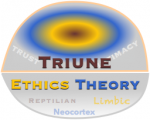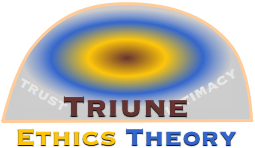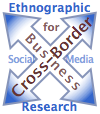
Trust and the Triune Ethics Theory reviews Darcia Narvaez’s breakthrough Triune Ethics Theory paper and draws new insights into how trust and relationship building work, based on the human brain’s evolutionary development, structure, and functions. And it sheds light on how experiential social media increases intimacy.
Triune Ethics Theory, Darcia Narvaez, Ph.D.
 Triune Ethics is an enthralling, exceedingly useful approach to understanding human behavior because it explains the context of trust and relationship building at a profound level that is actionable for anyone who wants deeper, richer, more flexible connections and collaboration with people. Triune Ethics Theory will help me to educate my clients and teams at a deep level, and it can give you a rare understanding of your own behavior—and that of people around you. Triune Ethics is an enthralling, exceedingly useful approach to understanding human behavior because it explains the context of trust and relationship building at a profound level that is actionable for anyone who wants deeper, richer, more flexible connections and collaboration with people. Triune Ethics Theory will help me to educate my clients and teams at a deep level, and it can give you a rare understanding of your own behavior—and that of people around you.
As with all my reviews, I will attempt to summarize this paper’s salient points before adding some reflections and conclusions about how I’m using its assertions in my work. As I have no formal training in neuroscience, I am drawing on lay study as well as psychology and my […]
 Ethnographic research for cross border business shows how to apply ethnographic research of social media to reducing the risks and costs of doing cross border business and deals. Ethnographic research can transform the value proposition of international business because it’s a very efficient way to conduct due diligence, to study the behavior and motivations of the people that the deal proposes to serve. Unlike traditional research methods, which are relatively slow, costly and qualitative, ethnographic research of social media combines qualitative richness with quantitative analysis. It’s faster and less costly, too. Ethnographic research for cross border business shows how to apply ethnographic research of social media to reducing the risks and costs of doing cross border business and deals. Ethnographic research can transform the value proposition of international business because it’s a very efficient way to conduct due diligence, to study the behavior and motivations of the people that the deal proposes to serve. Unlike traditional research methods, which are relatively slow, costly and qualitative, ethnographic research of social media combines qualitative richness with quantitative analysis. It’s faster and less costly, too.
Ethnographic research for cross border business can dramatically improve the depth and breadth of research for business and corporate strategy, market entry strategy, customer development, human capital strategy, product management, and others since it allows teams to consider more users and to assess their behavior and motivations, which can improve the value of more costly research.
Imagine that you can get deep qualitative and quantitative data on what your proposed clients, customers, employees and partners are discussing among themselves, specifically about the business scenario you propose to address. Ethnographic allows you to validate, with real people, […]
 CSRA milestones reflects on my first ten years of experiential social media, seen through the eyes of clients I’ve served. I’ll share what I learned about what outcomes we got in each engagement as well as how it happened that I developed and pioneered experiential, which if a repeatable process for developing trust and profit at scale. CSRA milestones reflects on my first ten years of experiential social media, seen through the eyes of clients I’ve served. I’ll share what I learned about what outcomes we got in each engagement as well as how it happened that I developed and pioneered experiential, which if a repeatable process for developing trust and profit at scale.
If you’d like to watch this post instead, just click the thumbnail button.
[…]
 Why Machines Won’t Displace Human Workers in the Knowledge Economy is a short thought experiment, in the spirit of all Noodles, which was in response to a post in Wired. In Here’s How to Keep the Robots From Stealing Our Jobs, John Hagel posited that a major rationale for the Knowledge Economy firm would be its role as a “knowledge platform” that enabled people to accelerate their learning and productivity. I highly recommend the post, which sparked many intelligent comments. Why Machines Won’t Displace Human Workers in the Knowledge Economy is a short thought experiment, in the spirit of all Noodles, which was in response to a post in Wired. In Here’s How to Keep the Robots From Stealing Our Jobs, John Hagel posited that a major rationale for the Knowledge Economy firm would be its role as a “knowledge platform” that enabled people to accelerate their learning and productivity. I highly recommend the post, which sparked many intelligent comments.
It’s obvious that many people are having difficulties imagining the world toward which we are hurtling, a world in which machines are getting “smarter” and able to “compete” for work roles that humans now do. In writing The Social Channel App, I thought long and hard about the Knowledge Economy and people’s roles in it, and its main thesis is that everything, from states and enterprises to people and products, will be differentiated in the Social Channel and that “humanness” will assume a much more visible importance in the economy.
[…]
 Big Data in Healthcare and Education shares how U.S. and UK government agencies used big data & analytics to help evolve national policy and outcomes. These examples are useful because they show the range of big data projects; the U.S. example is simple, yet it has profound impact on the health of the citizenry and therefore on the economy. The UK example is more involved and shows in depth how organizations can use big data to address expensive programs that are full of unknowns—like national education. Big Data in Healthcare and Education shares how U.S. and UK government agencies used big data & analytics to help evolve national policy and outcomes. These examples are useful because they show the range of big data projects; the U.S. example is simple, yet it has profound impact on the health of the citizenry and therefore on the economy. The UK example is more involved and shows in depth how organizations can use big data to address expensive programs that are full of unknowns—like national education.
This post shares my notes from a recent Deloitte Dbriefs webcast, Analytics in Action, which you may watch and download its slides. The webcast was moderated by Steve Dahl, and David Weir and Haris Irshad presented the examples.
[…]
 Hightech and U.S. Healthcare Transformation recaps The Future of Healthcare: How Technology is Enabling New Models of Healthcare Delivery, which was cosponsored by Katten Muchin Rosenmann and the Illinois Technology Association. The seminar featured five panelists with various points of view: two CEOs of healthcare start-ups, one venture capitalist, one healthcare management consultant and a healthcare attorney. Hightech and U.S. Healthcare Transformation recaps The Future of Healthcare: How Technology is Enabling New Models of Healthcare Delivery, which was cosponsored by Katten Muchin Rosenmann and the Illinois Technology Association. The seminar featured five panelists with various points of view: two CEOs of healthcare start-ups, one venture capitalist, one healthcare management consultant and a healthcare attorney.
The consensus was that, at long last, U.S. healthcare is going to progress beyond the waiting room; a perfect storm of market forces and technology enablement has created the conditions for significant reform. Regulations are balancing privacy, protections and digitization, and start-ups are attacking pockets of inefficiency, often through mobile applications and cloud solutions. Technology empowers patients and providers because information is increasingly available real-time. Information enables patients to be more aware of their health as well as the ramifications of their decisions, and it can improve collaboration between provider and patient.
Government is a major change agent; the U.S. taxpayer is footing a higher and higher bill, and healthcare has absorbed all wage gains for many years now, effectively preventing Americans from improving their quality of life. Read on for my […]
 Chicago-Style Innovation is my notes from Lightbank Innovation Day, which took place on 9 May 2013 at the City Winery (presentations) and Lightbank’s offices (networking). Throughout the day, it was obvious that the Knowledge Economy’s Social Channel was unfolding; entrepreneurs’ startups are stripping off an increasing breadth of enterprise processes and using digital social software to improve them. For example, Needle’s platform creates experts in user (customer) use cases and outcomes that outperform anyone at retail; Fieldglass, HighGround, Fooda, oDesk and TalentBin take aim at various parts of human capital while Aon Hewitt showed how to practice enterprise innovation on the inside; DoubleDutch aims to [at long last] digitize trade shows and conferences through its platform’s geosocial functions. Sprout Social and Contently offered social tools. Chicago-Style Innovation is my notes from Lightbank Innovation Day, which took place on 9 May 2013 at the City Winery (presentations) and Lightbank’s offices (networking). Throughout the day, it was obvious that the Knowledge Economy’s Social Channel was unfolding; entrepreneurs’ startups are stripping off an increasing breadth of enterprise processes and using digital social software to improve them. For example, Needle’s platform creates experts in user (customer) use cases and outcomes that outperform anyone at retail; Fieldglass, HighGround, Fooda, oDesk and TalentBin take aim at various parts of human capital while Aon Hewitt showed how to practice enterprise innovation on the inside; DoubleDutch aims to [at long last] digitize trade shows and conferences through its platform’s geosocial functions. Sprout Social and Contently offered social tools.
Presenters Gian Fulgoni, J Schwan and Ramon De Leon shared valuable advice for entrepreneurs, investors and enterprise executives. Fulgoni provided statistics that showed how mobile was eclipsing ecommerce and analog commerce; Schwan opened the audience’s eyes to Ubiquitous Computing and the Internet of Things, and De Leon showed the power of (pervasively ;^) being yourself.
[…]
 U.S. healthcare transformation has been the subject of innumerable conferences, debates and programs for many years, and social business will play a large role. Reducing cost without sacrificing quality of care has become the common goal, so I believe social business will be a key lever because social technologies dramatically reduce the cost of collaboration. U.S. healthcare transformation has been the subject of innumerable conferences, debates and programs for many years, and social business will play a large role. Reducing cost without sacrificing quality of care has become the common goal, so I believe social business will be a key lever because social technologies dramatically reduce the cost of collaboration.
I have monitored healthcare reform for many years, and I sense that various factions, players and special interests are finally realizing that they must change. “Obamacare,” the protracted poor economy and a rapidly aging population are forcing many players out of their comfort zones.
I attended two events last week that provided interesting glimpses from behind the curtain, so I’ll share my notes here. One conference was co-sponsored by Baker & McKenzie and Deloitte, and the other was held at the University of Chicago Booth School of Business.
[…]

You can create more opportunity with a career mission, especially when you don’t get distracted by traditional career or job search concerns like whether you have a “consulting” or “employment” relationship. Here I’ll share how you can create far more opportunity by changing your assumptions about work, tapping the Social Channel and aligning yourself with the emerging Knowledge Economy. To illustrate the point, I’ll use myself as an example because I’m a veteran of many types of “work arrangements.”
It’s the good news-bad news story of the almost-decade: legacy “work” and “jobs” have permanently gone by the wayside as the primary means for people to be productive in “modern” economies (bad news). However, people can create a higher quality of life by adopting a more flexible approach to work, and organizations are crying out for flexibility (good news).
[…]
 It is exciting to see widening recognition that brand survival depends on improving the lives of customers, not merely “pushing product” as they are accustomed to doing. In the latest example, Business Should Focus on Sociality, Not Social “Media”, Umair Haque offered a case for the end of social media and the disruption of many Industrial Economy structures, namely the social contract. It is exciting to see widening recognition that brand survival depends on improving the lives of customers, not merely “pushing product” as they are accustomed to doing. In the latest example, Business Should Focus on Sociality, Not Social “Media”, Umair Haque offered a case for the end of social media and the disruption of many Industrial Economy structures, namely the social contract.
As regular readers well know, I agree with Haque’s key thesis, that brands need to jettison their legacy focus on products/services in favor of dedicating themselves to helping users achieve outcomes while using their products. I have often written that humans and their organizations will have to adopt a more collaborative and responsible attitude and approach in general. However, I don’t agree with him that there’s only one way to do “sociality” as he implies by his assertion that brands have an “existential responsibility” to “the art of living.” Here I’ll explain the differences, which will help brand stewards understand the nuances of brands’ disruption.
[…]
|
|

 Triune Ethics is an enthralling, exceedingly useful approach to understanding human behavior because it explains the context of trust and relationship building at a profound level that is actionable for anyone who wants deeper, richer, more flexible connections and collaboration with people. Triune Ethics Theory will help me to educate my clients and teams at a deep level, and it can give you a rare understanding of your own behavior—and that of people around you.
Triune Ethics is an enthralling, exceedingly useful approach to understanding human behavior because it explains the context of trust and relationship building at a profound level that is actionable for anyone who wants deeper, richer, more flexible connections and collaboration with people. Triune Ethics Theory will help me to educate my clients and teams at a deep level, and it can give you a rare understanding of your own behavior—and that of people around you.
 Ethnographic research for cross border business shows how to apply ethnographic research of social media to reducing the risks and costs of doing cross border business and deals. Ethnographic research can transform the value proposition of international business because it’s a very efficient way to conduct due diligence, to study the behavior and motivations of the people that the deal proposes to serve. Unlike traditional research methods, which are relatively slow, costly and qualitative, ethnographic research of social media combines qualitative richness with quantitative analysis. It’s faster and less costly, too.
Ethnographic research for cross border business shows how to apply ethnographic research of social media to reducing the risks and costs of doing cross border business and deals. Ethnographic research can transform the value proposition of international business because it’s a very efficient way to conduct due diligence, to study the behavior and motivations of the people that the deal proposes to serve. Unlike traditional research methods, which are relatively slow, costly and qualitative, ethnographic research of social media combines qualitative richness with quantitative analysis. It’s faster and less costly, too. CSRA milestones reflects on my first ten years of experiential social media, seen through the eyes of clients I’ve served. I’ll share what I learned about what outcomes we got in each engagement as well as how it happened that I developed and pioneered experiential, which if a repeatable process for developing trust and profit at scale.
CSRA milestones reflects on my first ten years of experiential social media, seen through the eyes of clients I’ve served. I’ll share what I learned about what outcomes we got in each engagement as well as how it happened that I developed and pioneered experiential, which if a repeatable process for developing trust and profit at scale. Why Machines Won’t Displace Human Workers in the Knowledge Economy is a short thought experiment, in the spirit of all Noodles, which was in response to a post in Wired. In Here’s How to Keep the Robots From Stealing Our Jobs, John Hagel posited that a major rationale for the Knowledge Economy firm would be its role as a “knowledge platform” that enabled people to accelerate their learning and productivity. I highly recommend the post, which sparked many intelligent comments.
Why Machines Won’t Displace Human Workers in the Knowledge Economy is a short thought experiment, in the spirit of all Noodles, which was in response to a post in Wired. In Here’s How to Keep the Robots From Stealing Our Jobs, John Hagel posited that a major rationale for the Knowledge Economy firm would be its role as a “knowledge platform” that enabled people to accelerate their learning and productivity. I highly recommend the post, which sparked many intelligent comments. Big Data in Healthcare and Education shares how U.S. and UK government agencies used big data & analytics to help evolve national policy and outcomes. These examples are useful because they show the range of big data projects; the U.S. example is simple, yet it has profound impact on the health of the citizenry and therefore on the economy. The UK example is more involved and shows in depth how organizations can use big data to address expensive programs that are full of unknowns—like national education.
Big Data in Healthcare and Education shares how U.S. and UK government agencies used big data & analytics to help evolve national policy and outcomes. These examples are useful because they show the range of big data projects; the U.S. example is simple, yet it has profound impact on the health of the citizenry and therefore on the economy. The UK example is more involved and shows in depth how organizations can use big data to address expensive programs that are full of unknowns—like national education. Hightech and U.S. Healthcare Transformation recaps The Future of Healthcare: How Technology is Enabling New Models of Healthcare Delivery, which was cosponsored by Katten Muchin Rosenmann and the Illinois Technology Association. The seminar featured five panelists with various points of view: two CEOs of healthcare start-ups, one venture capitalist, one healthcare management consultant and a healthcare attorney.
Hightech and U.S. Healthcare Transformation recaps The Future of Healthcare: How Technology is Enabling New Models of Healthcare Delivery, which was cosponsored by Katten Muchin Rosenmann and the Illinois Technology Association. The seminar featured five panelists with various points of view: two CEOs of healthcare start-ups, one venture capitalist, one healthcare management consultant and a healthcare attorney. Chicago-Style Innovation is my notes from Lightbank Innovation Day, which took place on 9 May 2013 at the City Winery (presentations) and Lightbank’s offices (networking). Throughout the day, it was obvious that the Knowledge Economy’s Social Channel was unfolding; entrepreneurs’ startups are stripping off an increasing breadth of enterprise processes and using digital social software to improve them. For example, Needle’s platform creates experts in user (customer) use cases and outcomes that outperform anyone at retail; Fieldglass, HighGround, Fooda, oDesk and TalentBin take aim at various parts of human capital while Aon Hewitt showed how to practice enterprise innovation on the inside; DoubleDutch aims to [at long last] digitize trade shows and conferences through its platform’s geosocial functions. Sprout Social and Contently offered social tools.
Chicago-Style Innovation is my notes from Lightbank Innovation Day, which took place on 9 May 2013 at the City Winery (presentations) and Lightbank’s offices (networking). Throughout the day, it was obvious that the Knowledge Economy’s Social Channel was unfolding; entrepreneurs’ startups are stripping off an increasing breadth of enterprise processes and using digital social software to improve them. For example, Needle’s platform creates experts in user (customer) use cases and outcomes that outperform anyone at retail; Fieldglass, HighGround, Fooda, oDesk and TalentBin take aim at various parts of human capital while Aon Hewitt showed how to practice enterprise innovation on the inside; DoubleDutch aims to [at long last] digitize trade shows and conferences through its platform’s geosocial functions. Sprout Social and Contently offered social tools.
 It is exciting to see widening recognition that brand survival depends on improving the lives of customers, not merely “pushing product” as they are accustomed to doing. In the latest example, Business Should Focus on Sociality, Not Social “Media”, Umair Haque offered a case for the end of social media and the disruption of many Industrial Economy structures, namely the social contract.
It is exciting to see widening recognition that brand survival depends on improving the lives of customers, not merely “pushing product” as they are accustomed to doing. In the latest example, Business Should Focus on Sociality, Not Social “Media”, Umair Haque offered a case for the end of social media and the disruption of many Industrial Economy structures, namely the social contract.